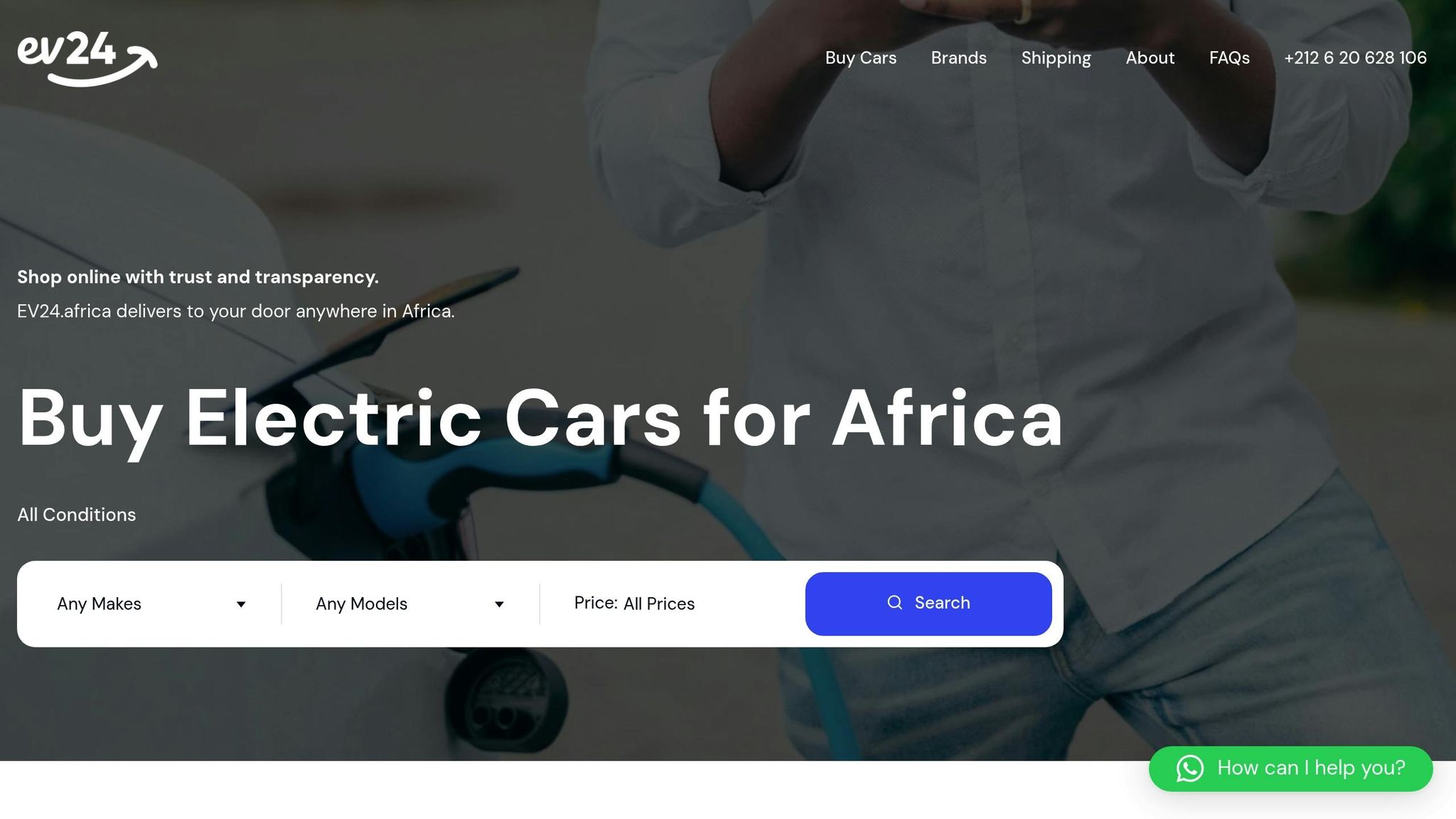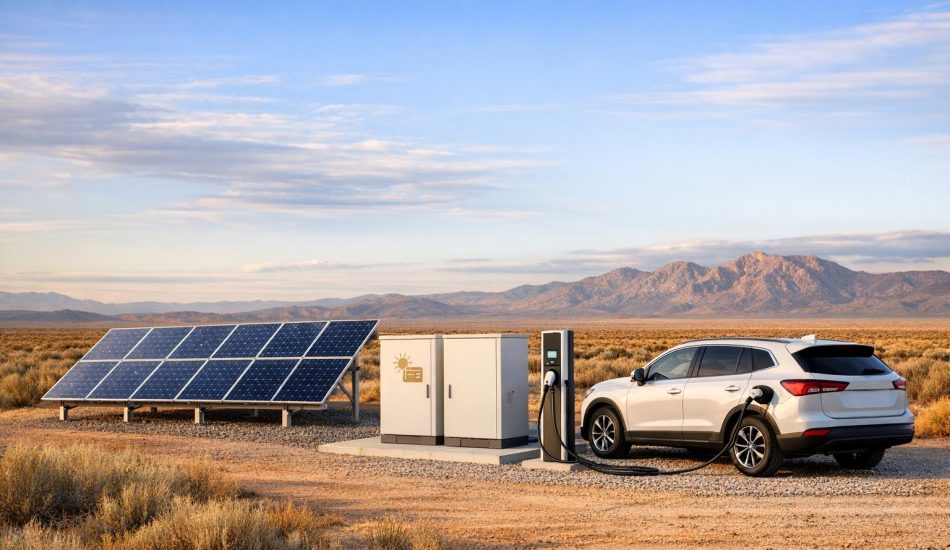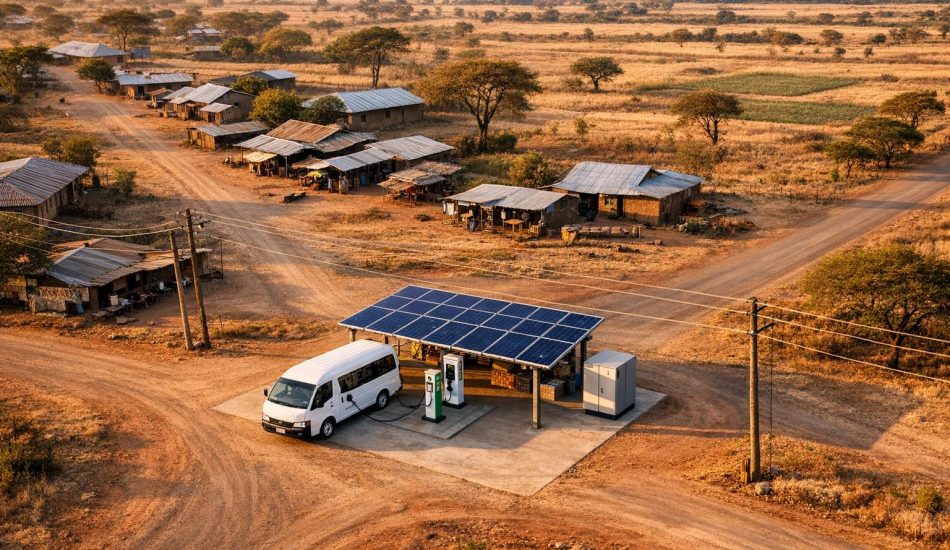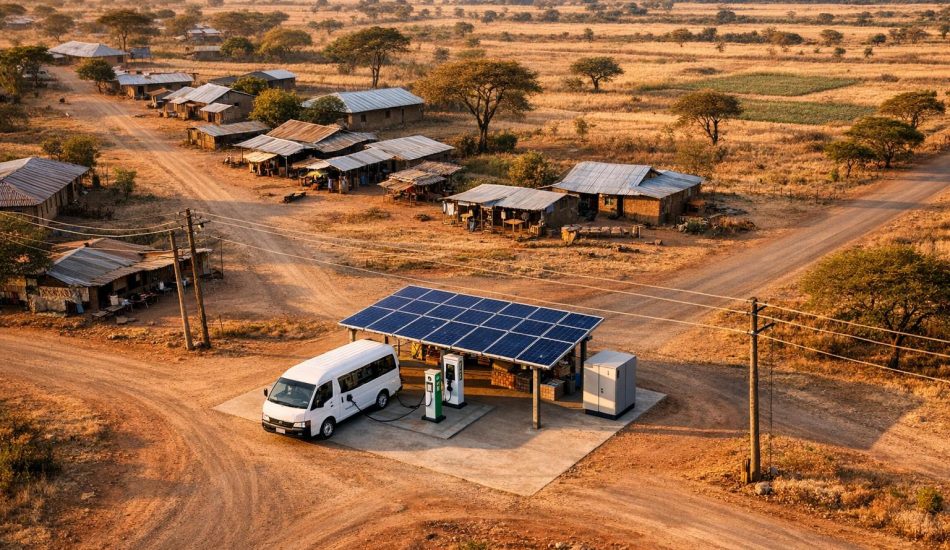
Thinking about buying an electric vehicle (EV) in Africa? Here’s what you need to know upfront:
- Why EVs? They’re cheaper to run and maintain than traditional cars and help reduce greenhouse gas emissions. For example, replacing a diesel bus with an electric one in Nairobi cuts CO₂ emissions by 50 tons annually.
- Government Incentives: Countries like Ethiopia and Mauritius offer tax breaks and duty exemptions to make EVs more affordable.
- Charging Infrastructure: South Africa and Egypt lead the way with growing networks of public charging stations. Still, check your local area for grid reliability and access to chargers.
- Weather Impacts: Extreme temperatures can affect battery performance, but modern EVs with battery management systems handle this better.
- Costs: While EVs can be expensive upfront, they save money in the long run. For instance, driving an EV in Angola costs $0.21 per 100 km compared to $2.40 for a gasoline car.
- Best Picks: Affordable options like the BYD Seagull (starting at $8,700) are great for city driving, while high-end models like the BMW i3 are durable for tougher conditions.
Quick Tip: Platforms like EV24.africa simplify the buying process with financing, delivery, and setup services.
Ready to dive deeper? Let’s explore how to choose the right EV for your needs, navigate costs, and find the best models for African roads.
What to Check Before Buying an Electric Car in Africa
Types of Electric Cars and Their Uses
Electric vehicles (EVs) come in various forms to suit different driving needs. Battery Electric Vehicles (BEVs) run entirely on electricity, making them a great choice for short urban trips. On the other hand, Plug-in Hybrid Electric Vehicles (PHEVs) combine an electric motor with a traditional engine, offering a mix of electric efficiency and gasoline reliability – perfect for areas where charging stations are sparse.
In bustling cities, BEVs shine as the go-to option for daily commutes. Meanwhile, PHEVs are better suited for regions with limited charging infrastructure or for longer, inter-city journeys. However, it’s not just about vehicle type; local weather and environmental factors can also significantly impact an EV’s performance.
How Weather Affects Battery Life
Weather plays a big role in how well an EV battery performs. Batteries operate best at around 68°F (20°C), but their efficiency drops when temperatures stray too far from this sweet spot. For example, at 14°F (-10°C), charging power may decrease by roughly 15%. While performance holds steady in hotter climates above 104°F (40°C), prolonged exposure to high temperatures can speed up battery wear and tear.
Fortunately, Battery Thermal Management Systems (BTM) can improve charging efficiency by over 30% when parked, and preconditioning the cabin can boost overall efficiency by 8–9% in extreme conditions. These features are worth considering, especially in regions with harsh weather.
Finding Charging Stations and Power Supply
Africa’s charging infrastructure is evolving, with some countries making impressive strides. In 2020, South Africa ranked fifth globally for the ratio of public charging stations to EVs, supporting long-distance travel across the country. Here’s a snapshot of key developments in the region:
| Country | Key Infrastructure Development | Capacity/Features |
|---|---|---|
| South Africa | Extensive public charging network | High station-to-EV ratio |
| Egypt | Wataniya Petroleum station (2022) | 14 simultaneous charges, 330+ kWh |
Egypt, for instance, has made notable progress with the launch of its largest charging station, a collaboration between MB for Engineering and Wataniya Petroleum. This station can handle up to 14 vehicles at once, showcasing the region’s growing commitment to EV infrastructure.
When planning to buy an EV, check the reliability of your local power grid, locate charging stations along your regular routes, and evaluate whether your home can support a charging setup.
"Charging stations for EVs was cited in the report, as one of the major prerequisites needed to encourage more people to own EVs."
Costs and Money-Saving Benefits
Purchase Price and Initial Costs
Electric vehicles (EVs) come with a hefty price tag upfront. In South Africa, for instance, import duties on EVs stand at 25%, compared to 18% for traditional internal combustion engine (ICE) vehicles. This disparity contributes to higher prices and slower adoption rates, with only 1,179 battery electric vehicles (BEVs) sold between January and November 2024.
Here’s a breakdown of factors influencing EV pricing:
| Cost Component | Impact on Price |
|---|---|
| Import Duties | 25% for EVs |
| Base Vehicle Cost | Higher than equivalent ICE models |
| Shipping & Handling | Varies by country |
| Registration Fees | Country-specific |
Tax Breaks and Support Programs
To counterbalance high upfront costs, several African countries offer financial incentives and tax breaks for EV buyers.
- Mauritius: Individual EV buyers can receive a 10% rebate on excise duty, capped at Rs 200,000 (approximately $4,500).
- Ethiopia: Electric vehicles are exempt from VAT, surtax, and excise tax.
In South Africa, Finance Minister Enoch Godongwana has introduced a program starting March 1, 2026, aimed at encouraging local EV production. Under this initiative, manufacturers can claim 150% of qualifying investment spending on EVs in the first year.
"This incentive to boost local manufacturing is a positive step forward, but we also need to reduce the current high import duties for EVs – 25% compared to 18% for combustion engine vehicles. These taxes inflate EV prices, slow demand, and limit market growth." – CHARGE
Such incentives not only make EVs more accessible but also contribute to long-term savings by lowering the total cost of ownership.
Long-term Savings Analysis
When it comes to operational costs, EVs consistently outperform traditional vehicles. Here’s a cost comparison over 100 km:
| Vehicle Comparison | Location | Cost per 100 km |
|---|---|---|
| Hyundai Ioniq (EV) | Angola | $0.21 |
| Toyota Corolla (ICE) | Angola | $2.40 |
| Mercedes EQC (EV) | South Africa | $1.49 |
| Mercedes GLE (ICE) | South Africa | $12.20 |
EVs also save on maintenance since they have fewer moving parts. Routine expenses like oil changes and spark plug replacements are eliminated, and EV batteries generally maintain their performance for over 160,000 km.
The timeline for EVs to match the total ownership cost of ICE vehicles depends on financing conditions. With no import duties and an interest rate of 10%, EVs can achieve cost parity within the first year. However, under current market conditions, this parity is reached around the eleventh year of ownership.
Best Electric Cars for African Roads
Budget-Friendly Electric Cars
Affordable electric vehicles (EVs) are making headway in Africa, offering practical options for urban and local commuting. One standout is the BYD Seagull, an entry-level EV equipped with a 30.7 kWh LFP battery and a 55 kW (75 hp) motor. With an expected starting price of around $8,700, it’s a solid choice for city driving.
Another option is the Funky Electric FE1, featuring a 4 kW motor, a top speed of 37 mph (60 km/h), and a range of 62 miles. It’s perfect for short-distance travel and comes with a price tag under $10,000.
| Model | Battery Size | Range | Top Speed | Price Range |
|---|---|---|---|---|
| BYD Seagull | 30.7 kWh | – | – | $8,700+ |
| Funky Electric FE1 | 4 kWh | 62 miles | 37 mph | Under $10,000 |
For those seeking more advanced features and durability, premium EVs offer solutions tailored to challenging road conditions.
High-End Electric Cars
Premium electric vehicles are proving their reliability on African roads. For example, a BMW i3 in South Africa managed to clock an impressive 187,000 miles (301,998 km) while maintaining 85% of its original 21.6 kWh battery capacity. This durability highlights its ability to handle tough weather and road conditions.
"A vehicle I think could kickstart this if produced at scale to feed African markets is the upcoming BYD Seagull." – Remeredzai Joseph Kuhudzai, CleanTechnica
When choosing a high-end EV for African terrain, it’s essential to focus on vehicles that can handle:
- Harsh weather conditions
- Rough or uneven roads
- Easy access to spare parts
- Reliable repair networks
Electric Vehicles for Business Use
Electric vehicles are becoming increasingly popular for business applications across Africa. Here are two models that stand out for commercial use:
- Dongfeng Rich 6 EV Pickup
This electric pickup offers a powerful 119 kW motor and a 68 kWh battery, delivering a range of 248 miles (400 km) under NEDC standards. It also supports fast charging, reaching 80% capacity in just 45 minutes. - BYD T3 Electric Van
Designed for urban and commercial use, the BYD T3 features a 50.3 kWh battery and a 100 kW motor with 180 Nm of torque. It provides a city driving range of 192 miles (310 km) and a WLTP combined range of 167 miles (269 km).
Commercial EVs are already making an impact. For instance, Zimbabwe’s CMED uses BYD T3 vans for airport shuttles, while companies in Kenya offer leasing options for models like the Nissan ENV200 and BYD T3. These developments underscore the growing role of EVs in African business operations.
sbb-itb-99e19e3
How to Buy Through EV24.africa

Available Cars and Brands
EV24.africa offers a diverse range of electric vehicles (EVs) from some of the most recognized brands in the industry, including Tesla, BYD, Volkswagen, Mercedes-Benz, XPeng, and Leapmotor. Prices cover a wide spectrum, catering to different budgets. For instance, while models like the Mahindra eKUV100 have been priced as low as $10,300 in some comparisons, most entry-level EVs start at about $21,000. On the higher end, premium models can go up to $800,000.
Here’s a snapshot of popular models currently available:
| Category | Models | Starting Price | Key Features |
|---|---|---|---|
| Entry-Level | BYD Dolphin, Mahindra eKUV100 | Around $21,000 | Affordable and ideal for city use |
| Mid-Range | BYD Atto 3, Leapmotor T03 | Around $40,000 | Enhanced range with modern features |
| Premium | Mercedes-Benz EQS, BMW i Series | Up to $800,000 | High-end luxury with cutting-edge technology |
Note: Prices are approximate and can vary depending on configurations and market conditions.
After selecting your preferred EV, you can explore flexible payment options available on the platform.
Payment and Loan Options
EV24.africa provides multiple payment methods to make the purchasing process as convenient as possible:
- Bank transfers
- Credit or debit cards
- Mobile money
- Payments in USD or local currency
For those who need financing, the platform offers flexible payment plans customized to individual profiles. EV24.africa ensures pricing transparency, so buyers can expect clear quotes with no hidden fees.
"Transparent Pricing & Financing Options. No hidden costs, clear quotes, and support for flexible payment solutions." – EV24.africa
Delivery and Setup Services
Once you’ve completed your purchase, EV24.africa takes care of the delivery and setup, making the transition to EV ownership seamless. Buyers can choose from several shipping methods, including RoRo, container, port-to-port, or even door-to-door delivery. The platform also manages critical steps like customs clearance, local registration, and access to service centers.
Additionally, EV24.africa collaborates with certified professionals to install charging stations for both homes and businesses. First-time EV owners receive guidance on setup and gain access to a dedicated support hotline for any questions or concerns.
The Reality of Driving an Electric Vehicle in Nigeria: Prices, Batteries, chargers | EV World Africa
Conclusion: Steps to Choose Your Electric Car
Selecting the right electric vehicle (EV) doesn’t have to be complicated. By focusing on key factors, you can make an informed decision that fits your lifestyle and budget. Here’s a simple guide to get started:
1. Assess Your Needs
Think about your daily routine and driving habits. How far do you commute? Do you need space for family or cargo? Consider road conditions in your area and whether you have access to charging-ready parking at home or work.
2. Check Local Support
An EV is only as convenient as the infrastructure around it. Look into the availability of charging stations nearby, the reliability of your local power grid, and the proximity of service centers. Don’t forget to evaluate the coverage of charging networks in your region.
3. Calculate Costs
Owning an EV involves more than just the sticker price. Factor in purchase and import fees, insurance, registration, charging costs, and projected maintenance expenses. A clear breakdown of these costs will help you understand the full financial picture.
4. Examine Specifications
Pay attention to features that match your environment and needs. Consider the EV’s range in extreme temperatures, ground clearance for uneven roads, compatibility with local charging setups, and the availability of replacement parts.
If you’re feeling overwhelmed, EV24.africa is here to help. The platform simplifies the process by letting you compare specifications, check prices, and even schedule test drives. With their tools and expertise, you can find an EV that’s dependable in African conditions and offers lasting savings. Reach out to their team for tailored advice and a hassle-free transition to electric driving.
FAQs
How can I maintain my electric vehicle’s battery in Africa’s extreme weather conditions?
To keep your EV battery in great shape, try to avoid exposing it to extreme temperatures. If you live in a hot area, park in shaded spots or cooler locations to help prevent overheating. When it comes to charging, aim to keep the battery level between 20% and 80% – this range helps reduce long-term wear. Also, limit the use of fast charging, as it generates extra heat and can strain the battery over time.
Another important tip: keep your vehicle’s software up to date. Manufacturers often release updates designed to improve battery performance and efficiency. By following these steps, you can help extend your EV battery’s lifespan, even in regions with tough weather conditions.
What are some ways to manage the high upfront cost of electric vehicles in Africa, and are there any financial incentives available?
Managing the upfront cost of electric vehicles (EVs) in Africa can feel like a challenge, but there are ways to make it more manageable. Many countries are stepping in with financial incentives like tax breaks, subsidies, or reduced import duties to help bring EV prices within reach. On top of that, local manufacturing efforts are starting to cut production costs, which could make EVs more competitively priced in the future.
Though the initial price tag of an EV might seem steep, it’s worth looking at the long-term savings. EVs generally cost less to maintain and have much lower fuel expenses compared to traditional gas-powered cars. When you combine these savings with available incentives, owning an EV can actually turn out to be a smarter financial choice over time.
What should I look for in the charging infrastructure near me before buying an electric vehicle in Africa?
When evaluating the charging infrastructure in your area, start by looking into the location and convenience of charging stations. Focus on spots near your home, workplace, or places you visit often. Having chargers in these key areas can make owning an EV much more practical.
Next, check if the chargers are compatible with your vehicle and whether they include fast-charging options for those times when you need a quicker charge. It’s also important to assess the stability of the local power grid, as a reliable electricity supply is essential for consistent EV charging. If you can, dig into the performance of local charging networks to see if they align with your needs and expectations.




